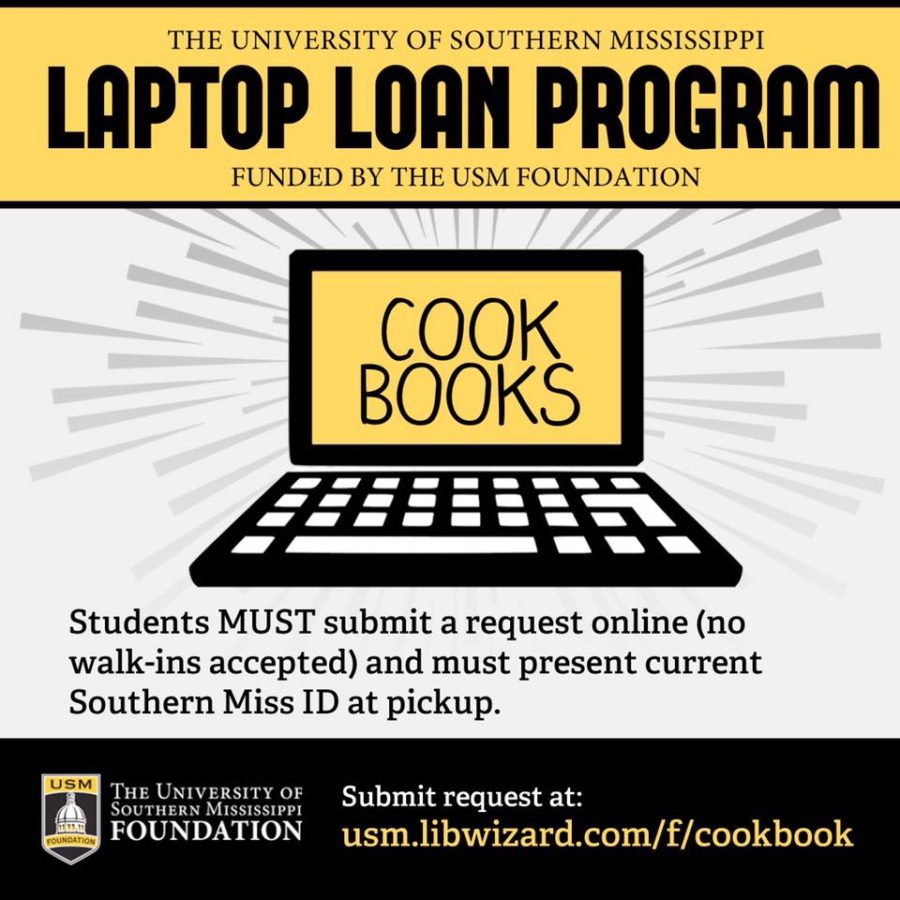Students at the University of Southern Mississippi now have a greater chance at success in remote learning thanks to an initiative from the USM Foundation and the Coronavirus Response Implementation Team with their new Laptop Loan Program.
Sarah Mangrum, the Access Services and Assessments Librarian for Cook Library, is the face of the program. She handles the logistics of receiving laptop requests and communicating pickup with students.
“We knew there was a need,” Sarah Mangrum said. “I did not know how great that need was.”
Since Sep. 2, the program application has logged 154 laptop requests between the Hattiesburg and Gulf Park campuses, and has, as of writing, issued around 60 laptops to students.
With school back in session, some students without computer access have been able to once again rely on Cook Library, as the COVID-19 pandemic made it impossible to access earlier this year. However, many other students may not want to utilize public facilities to avoid COVID-19 exposure.
Regardless of the reason, many students, especially those medically or financially affected by the pandemic, need assistance to access remote learning classes, which have become standard throughout this semester.
This led Magrum and Dr. Alison Gillespie, Assistant Provost for Academic Affairs, to start the Laptop Lending Program, designed to help overcome some of these hurdles and get students into a safe learning environment.
“[The program aims to] provide technology to students who otherwise may not have it, and as a result, are having a challenge to possibly completing their coursework,” Gillespie said.
Gillespie was able to get the laptops as a member of the COVID-19 Response Implementation Team, a group of Southern Miss officials tasked with managing the ongoing public health crisis for the university. The Response team purchased computers to give to students with funds from the Coronavirus Aid, Relief and Economic Security (CARES) Act, which the U.S. Congress passed shortly after the onset of the pandemic.
Other major contributors came to the forefront to help out students, too. The team was able to collect around 50 faculty trade-in computers from different academic departments. Once Gillespie realized the true scope of technological need from students, the Response team wrote for a grant from the USM Foundation. The Foundation, in turn, granted them $90,000, which let the Response team purchase 130 new Dell laptops loaded with antivirus and other security software.
Students who apply to borrow a laptop through the program can retrieve it from the Cook Library at the Hattiesburg campus or at the Gulf Coast Library at the Gulf Park campus. Both libraries will also offer curbside pickup for students at greater risk of or uncomfortable in coming into contact with COVID-19.
Gillespie said the response team plans to have more than 250 laptops available, but will adjust according to the needs of students. A shipment of 50 new laptops will become available soon for more students to borrow.
“This program makes [technology] accessible for everybody,” Mangrum added. “If you can’t afford a computer, this program takes down the barriers to that success, and they’re able to get that technology in their hands.”
Mangrum has heard students rave about how this program has helped them in just a short time.
“I’ve already seen the impact [of this program] through the gratefulness of the students,” Mangrum said. “They have been so appreciative just to be able to get access to technology.”


























